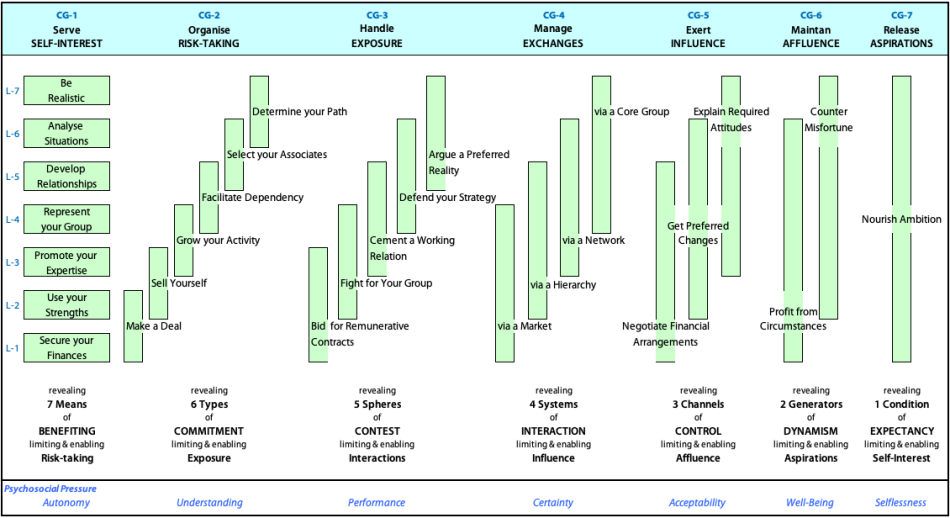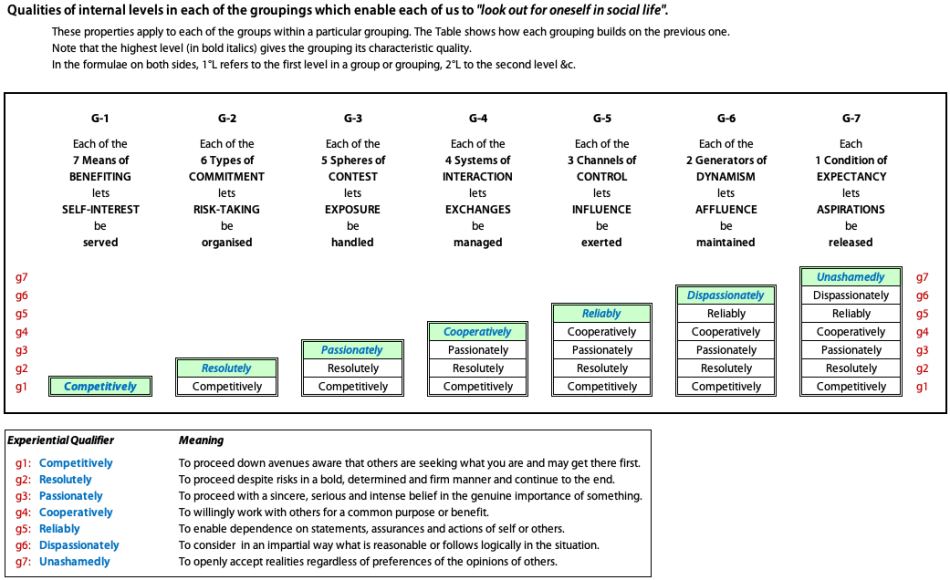Review
Self & the Social World
The 7 groupings are divided into two section: an initial 4 that are oriented inward to the self and its pressures, and a final 3 that are oriented outward to the social world to ensure, as best you can, that it meets your concerns.
Groupings 1 to 4 represent efforts to benefit your self with the social world in a supporting role.
: Finding ways to gain advantage over others opportunistically.
This calls for a ruthless egocentrism and a recognition that self-management is the basis of surviving and thriving in our competitive world.
: Making a leap of faith to gain a foothold in society despite the risks involved.
This calls for a resolute commitment supported by courage as well as common-sense to avoid loss of face or worse.
: Being ready to articulate, defend and assert a social identity in ways that produce results that you want.
This calls for being practical when putting your head above the parapet and a genuineness based on your passion.
: Ensuring your wishes and wants are satisfied by other people when you cannot satisfy them on your own.
This calls for cooperative interaction in settings that facilitate exchanges based on reciprocity and honesty.
Groupings 5 to 7 represent efforts to handle the social world as the dominant influence within which you seek to preserve and support yourself.
: Finding ways to impact on events so that situations evolve in ways that you prefer.
This calls for judgement in regard to the situation and persuasiveness in regard to dealing with others.
: Protecting your standard of living in an ever-changing world.
Wealth cannot be taken for granted and so this calls for energy in exploiting the milieu, and positivity in the face of adversity.
: Engaging with the future through releasing your aspirations.
This calls for attention to yourself with awarenessof the social world and your potential place in it, and an inner sense of rightness, even experience of a vocation or calling, in regard to your ambitions.
The 28 Components of Looking Out for Yourself
The diagrams below show the component groups of the structural hierarchy and the qualifiers that have been applied.


Why not Cheat?
Let's not be picky here. If you ask"why not cheat?" then why not go the full hog: why not pillage, loot, steal, rob and kill if anyone stands in your way?
The answer is obvious: such anti-social actions will land you in jail where other people will look after your interests.
However, returning to "why not cheat", you probably mean "why not act dishonestly if the likelihood is that no one will catch you"?
Pragmatically, once you start cheating and accepting your own dishonesty, then this likely to become a default mode of functioning embedded in your character. Do you really imagine that no one will see the sort of person you are and respond accordingly?
However, building character via is part of developing your better self—which was regarded as out of bounds at the commencement of this study.
So I conclude that, when operating within this framework you will definitely feel it is reasonable to cheat if you are confident that you won't get caught.
See more:
- There is a marked odd-even oscillation in this framework.
- Self-assertion meets psychosocial realism in the unfolding duality.
- Review the presence of psychosocial pressures.
OR
-
Continue to the next framework based on patterning the groupings: Determinants of a Public Persona.
Originally posted: 10-July-2025. Last amended: 10-Oct-2025.
